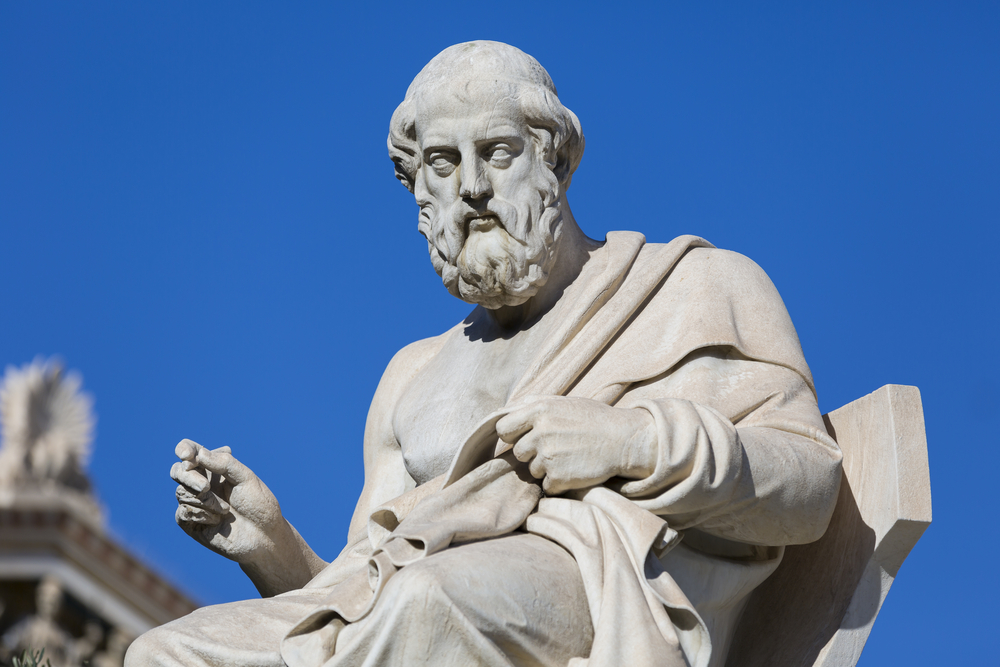My favorite back-to-school reading this year has been Alex Priou’s Musings on Plato’s Symposium. I hurry to add that I’ve long been out of school, but I did pick up the habit of reading there, and what’s more American than lifelong learning? I knew the author’s reputation and so hurried to read his musings. Almost nobody muses these days, I’ve noticed, but it’s deeply human to be thoughtful without being serious, to be playful without being silly. There’s much of the life of an intelligent man that has been driven out of public life and therefore out of our private lives, too.
I also confess a fondness for this beautiful Platonic work. The Symposium is the one case where Plato put a lot of literary effort into imitating, impersonating a comic poet and a tragic poet, as well as other impressive Athenian gentlemen, as they give speeches in praise of love, eros. You could say they’re the people for whose sake Pericles managed such an amazing empire. There’s wine involved somehow, too—the title means drinking party—and Socrates, the most famous philosopher in America as in Athens, seems pleased, even eager about the proceedings, like you or I might be. If philosophy could be quite this much of a novel or a movie scene, America would be a happier place.
But a word about the contemporary author first. Priou’s writing previously was academic in the best sense. He published his doctoral dissertation under the title Becoming Socrates, a study of Plato’s Parmenides that shows a willingness to fulfill the demands of serious scholarship, but also a manly daring, or youthful recklessness, to tackle one of the hardest problems in Platonic studies. That commentary earned him many admirers among students of Socratic philosophy.
Most Americans, of course, do not read dissertations. So to the intelligent public more broadly, Priou is known instead as a somewhat comic figure through his podcast The New Thinkery. The title is a pun that students of Socratic writing enjoy—the Thinkery is Aristophanes’ caricature of the Socratic school in The Clouds, composed of people who think they’re thinking, nowadays called losers. Perhaps Socrates must appear laughable in a democracy, American as well as Athenian. With two other scholars, Priou mingles broad jokes with discussions of books of political philosophy on this podcast, as well as interviews with venerable scholars and, occasionally, opinions on literature and even movies. It’s somewhat like a Great Books seminar—Priou studied at St. John’s—and it’s the best attempt I know of to encourage the intelligent audience to think about the great books gratis.
Musings on Plato’s Symposium is a mix of these two modes, the scholarly and the popular. It escapes the reach of the dead hand of the university, a collapsing institution where papers take quite a few years to make it to print and then are of interest to almost no one. These days, we have large numbers of deluded people running around with Ph.D.’s calling themselves philosophers as if they were latter-day Platos, with the result that the word is a mockery. No one suspects them of possessing wisdom; I’m not sure people would concede them even love of wisdom. They are resented for their arrogance and there is a public satisfaction in their unhappiness. Worst of all, the real philosophers are forgotten, and what we might learn from them is denied us because of this imposture, which would otherwise be rather harmless.
Priou doesn’t write for those people; instead of credentials or jargon, his prose appeals to American curiosity and the pleasure we take in clever speakers, but at our own pace, without committing too much time or interest in advance of evidence that our effort will prove worthwhile. He offers readers 100 pages split into 49 brief musings, each attracting the reader of Plato to one feature or another of the Symposium. He changes not only his focus with the perspective of each new matter that attracts his and our attention but also the level of analysis. The musings deal with several different things accordingly: literary features, historical allusions and political problems, the characters’ arguments and psychological features. Sometimes the reflections read like cliffhangers in an adventure story: you want to see how things connect and how they turn out.
Yet, by these degrees, Priou comes up with a complex imitation of the work Plato put into writing, a dialogue that, more than any other, hides the hard work of thinking behind pleasure and charm. I’m not sure he can put the work together, but he is fairly persuasive at taking it apart, and thus showing it as it is. An arrogant writer would have called such an essay Becoming Plato. In rejecting the people who pretend they are philosophers, Priou shows instead what a philosopher does—as best we can tell from the works of the philosophers, of which the only obvious ones are found in books. It makes sense, then, to turn to a broader public; the implicit claim is that the books were written for us. Plato would not have written for his own sake but for those who are not Plato. With a humbler or more modest attitude, we can come to see a lot more of the human drama that animates philosophy and could even learn to be grateful for Plato’s generosity.
My best guess is that the purpose of Musings on Plato’s Symposium is to encourage the sort of people whom Priou might enjoy teaching, since that’s his job. It’s a striking thing about American students that they are unable to muse. Things do not really strike them and thus arrest them. Their intellectual endeavor is too much the creature of institutions that reward conformism, performance. It gives them success by robbing them of experience, of anything on which to reflect; even if they wanted self-knowledge, they’d mostly be stuck with social science platitudes or the corrupting softness of therapeutic jargon.
So maybe Socrates and the problem of the Symposium—what love reveals about us and what it makes of us—is just what the doctor ordered for our students and, I suppose, for ourselves. But how do you start doing something you’ve not done before? Priou offers this guidance—he’ll do your musing for you to begin with and, if you follow along, you might sooner or later find yourself playing along and, indeed, taking your own steps down the path of self-knowledge.

